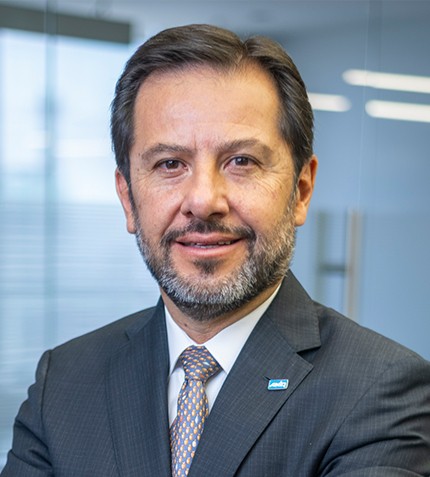
"We should focus on the complementarity of our industries and maintain the current conditions of the USMCA agreement, which have generated such good results for the industries of the three countries."
Miguel Benedetto
MANAGING DIRECTOR, ANIQ
How has 2025 been for ANIQ?
2025, has definitely been a year of great challenges for the chemical industry in Mexico, due to factors such as the international environment and new regulations that have been implemented in our country, which have changed the way the industry operates.
Some of these regulations are the amendments to the Hydrocarbons Law and the approval of the Customs Law, which are the most relevant, and others that are in the process of being implemented, such as the Circularity Law initiative.
We are also working with COFEPRIS to adapt the regulatory framework for essential chemicals and chemical precursors.
Another important front for ANIQ is the upcoming review of the USMCA, where we play a key role as representatives of the chemical and industrial sectors, particularly on issues of market access and rules of origin.
What amendments to the Hydrocarbons Act were approved at the request of ANIQ?
The Act establishes new regulations for the hydrocarbons sector, the main purpose of which is to apply stricter controls on fuels and petroleum derivatives, which now also include petrochemical products. Fortunately, the authority deemed it appropriate to incorporate our comments, leaving only five products subject to this regulation.
What impact could customs law have on the chemical industry?
The aim of this regulation is to reduce smuggling by increasing customs inspections. This measure has been promoted by the sectors affected by this problem, but it is counterproductive for ours, as it increases the costs associated with imports.
What new infrastructure will Mexico need to improve its competitiveness?
We need to renovate port facilities, especially the three vital ports on the Gulf of Mexico—Altamira, Veracruz and Coatzacoalcos—as well as the ports of Manzanillo and Lázaro Cárdenas on the Pacific coast, which would significantly boost the competitiveness of industry and the various value chains.
The current administration is committed to investing in passenger railways, for which tracks will be built parallel to the existing ones for freight transport. This is a major achievement, as it will not interfere with freight transport.
Likewise, many roads need to be improved, as the pace of economic growth has outstripped the expansion of the road network. If the country wants to attract more investment, it must also develop its customs infrastructure to make it faster and as cost-effective as possible.
What can we expect from the renegotiation of the USMCA?
For us, access to US inputs and ease of exports are fundamental, since 60% of US chemical exports go to Mexico, and 80% of oil and gas exports.
Mexico is the US's main trading partner, so we believe it is very likely that the agreement will be ratified, as it is in the interests of all three countries. For our part, the chemical industries of the three countries share common objectives, such as the development of an energy sector in North America, as well as taking advantage of the infrastructure and synergies that have been built up over the last thirty years.
Therefore, I believe that we should focus on the complementarity of our industries and maintain the current conditions of the agreement, which have generated such good results for the industries of the three countries.
What will be the content of the future circularity law?
ANIQ is strongly committed to circularity in the industry, while working in coordination with the authorities to address certain concerns that trouble us, such as extended producer responsibility.
On the other hand, Mexico's recycling rates are very competitive, as we are world leaders in PET and have recycling rates equivalent to those of the European Union.
What does the future hold for the sector in Mexico?
The future is very promising, as we have the interest, willingness, and support of the government to create development hubs and boost the chemical and petrochemical sector in Mexico. Nearshoring will eventually materialize, as Mexico has the potential to return to seventh place in chemical production.
We are also one of the five sectors that Plan Mexico identifies as priorities for development, and we have the opportunity to invest in the development of the sector, provided that the conditions for this are created. We are therefore optimistic, as Mexico is on the right track.









